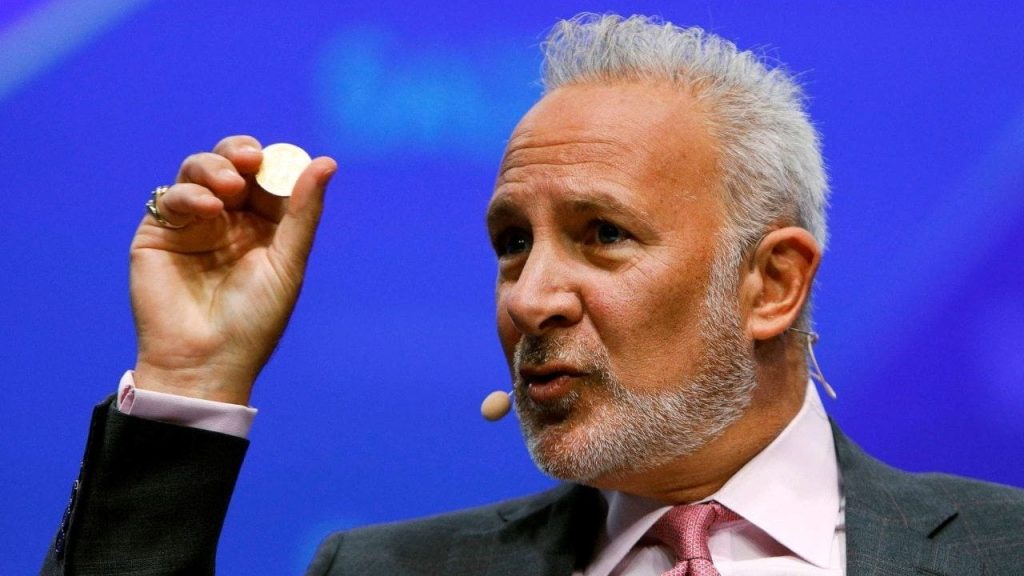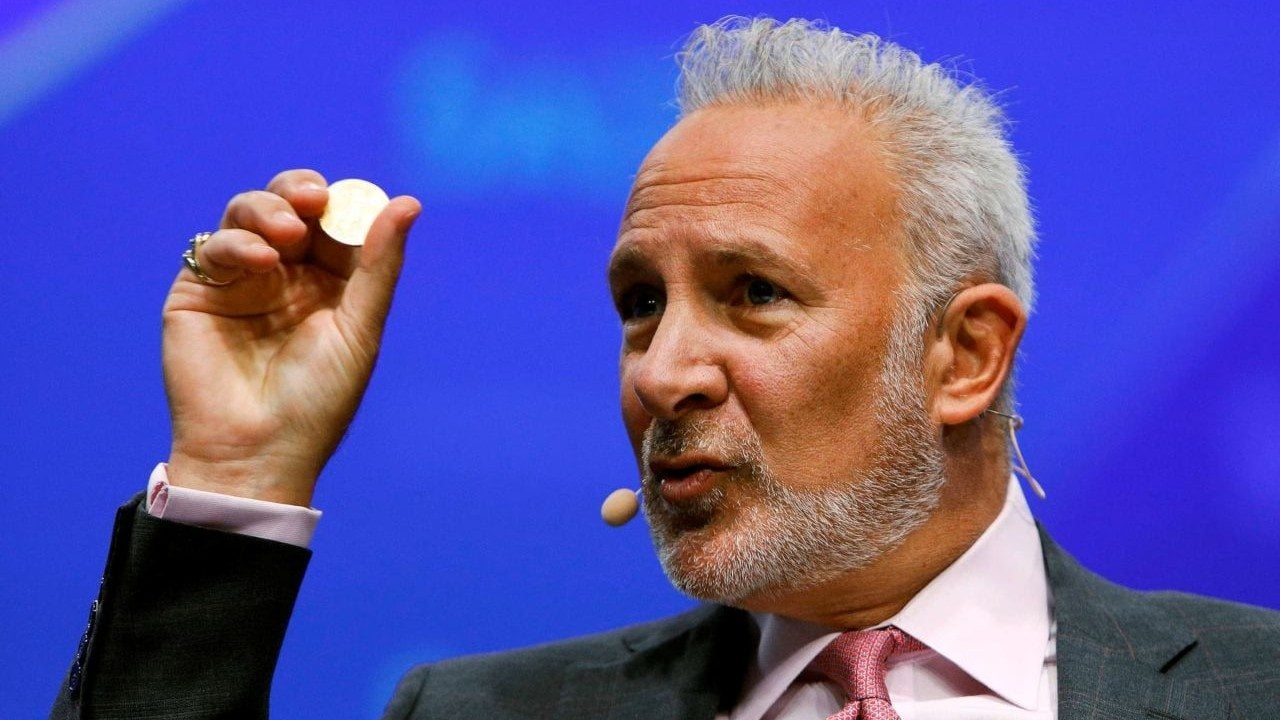
The Case for Bitcoin Over Ethereum: A Critical Examination of Peter Schiff’s Advice
Introduction: A Skeptic’s Shift
Peter Schiff, a vocal critic of cryptocurrencies and a staunch advocate for gold, has recently made an unexpected recommendation: investors should sell their Ethereum (ETH) holdings and purchase Bitcoin (BTC) instead. This advice, coming from a figure known for his skepticism towards digital assets, has sparked intense debate within the crypto community. To fully grasp the implications of this recommendation, it’s essential to dissect Schiff’s rationale, analyze the current market dynamics, and explore the fundamental differences between Bitcoin and Ethereum.
Schiff’s Perspective: Why Bitcoin Over Ethereum?
Bitcoin as Digital Gold
Schiff’s preference for Bitcoin over Ethereum is rooted in his belief that Bitcoin serves as a digital equivalent to gold. He argues that Bitcoin’s limited supply of 21 million coins makes it an attractive store of value, similar to gold’s role as a hedge against inflation and economic uncertainty. This scarcity is a key element in Bitcoin’s value proposition, which aligns with Schiff’s long-standing advocacy for gold as a safe-haven asset.
Ethereum’s Challenges
In contrast, Schiff views Ethereum as a more speculative and risky investment. He highlights several concerns:
- Competition: Ethereum faces intense competition from other blockchain platforms, such as Solana, Cardano, and Polkadot, which are vying for market share in the decentralized finance (DeFi) and non-fungible token (NFT) spaces.
- Scalability Issues: Ethereum has struggled with scalability, leading to high transaction fees and network congestion. While the Ethereum 2.0 upgrade aims to address these problems, its implementation has been gradual, and concerns remain.
- Regulatory Risks: Ethereum’s move to a Proof-of-Stake (PoS) consensus mechanism has raised questions about centralization and regulatory scrutiny. Schiff suggests that these changes could increase the risk of regulatory intervention.
By emphasizing these factors, Schiff suggests that Ethereum’s future is less certain than Bitcoin’s, making it a riskier investment in the current market environment.
Market Dynamics: ETH’s Rally and Institutional Interest
Schiff’s recommendation comes at a time when Ethereum has been experiencing a significant price increase, reaching a six-month high. This rally has been fueled by several factors:
- Spot Ethereum ETFs: The potential approval of spot Ethereum ETFs in the United States has generated considerable excitement. These ETFs would provide institutional and retail investors with easier access to Ethereum, potentially driving demand and price appreciation.
- Institutional Adoption: Institutional interest in Ethereum has been growing, driven by its role in DeFi, NFTs, and other emerging blockchain applications. Institutional investors see Ethereum as a key infrastructure component of the decentralized web.
- Market Sentiment: Positive market sentiment and improved treasury flows have also contributed to Ethereum’s recent surge.
However, Schiff might view this rally with skepticism, considering it a temporary phenomenon driven by speculation rather than fundamental value. He may believe that the market is overestimating the likelihood of Ethereum ETF approval or the sustainability of its current growth rate.
Bitcoin vs. Ethereum: A Comparative Analysis
To fully assess Schiff’s recommendation, it’s crucial to understand the fundamental differences between Bitcoin and Ethereum:
Primary Purpose
- Bitcoin: Designed as a store of value and a digital equivalent to gold, Bitcoin’s primary use case is to serve as a hedge against inflation and economic uncertainty.
- Ethereum: Ethereum is a platform for decentralized applications (dApps), enabling the creation of smart contracts, DeFi protocols, NFTs, and other innovative blockchain applications.
Consensus Mechanism
- Bitcoin: Bitcoin uses a Proof-of-Work (PoW) consensus mechanism, which requires miners to solve complex mathematical problems to validate transactions and secure the network.
- Ethereum: Ethereum has transitioned to a Proof-of-Stake (PoS) consensus mechanism, where validators stake their ETH to secure the network and validate transactions. This shift aims to improve scalability and reduce energy consumption.
Scalability
- Bitcoin: Bitcoin’s scalability is limited, with Layer-2 solutions, such as the Lightning Network, being developed to address this issue.
- Ethereum: Ethereum has been working on scalability improvements through the Ethereum 2.0 upgrade, which includes the implementation of sharding and rollups to enhance network capacity.
Use Cases
- Bitcoin: Bitcoin’s use cases are primarily focused on store of value, payments, and as a hedge against inflation.
- Ethereum: Ethereum’s use cases are more diverse, encompassing DeFi, NFTs, DAOs, and smart contracts, making it a more versatile platform for blockchain innovation.
Supply
- Bitcoin: Bitcoin has a fixed supply of 21 million coins, which makes it a deflationary asset.
- Ethereum: Ethereum does not have a fixed supply, and its monetary policy is more flexible, with mechanisms like EIP-1559 and the upcoming “Ethereum Improvement Proposal 4844” (EIP-4844) aiming to adjust supply dynamics.
Implications and Considerations
Schiff’s recommendation to swap ETH for BTC is not without merit, but it’s crucial to consider the potential implications and individual investment goals before acting on it:
Risk Tolerance
Investors with a lower risk tolerance might find Bitcoin’s stability and established narrative more appealing. Those who are more comfortable with risk and seek higher growth potential may prefer to hold Ethereum.
Investment Horizon
For long-term investors seeking a store of value, Bitcoin may be a suitable choice. For those who believe in the long-term potential of decentralized applications and are willing to weather potential volatility, Ethereum may be a better fit.
Diversification
It’s generally advisable to diversify investments across different asset classes, including cryptocurrencies. A balanced portfolio that includes both Bitcoin and Ethereum may be a prudent approach.
Market Timing
Attempting to time the market by selling Ethereum at its peak and buying Bitcoin at its low is a risky strategy. Market conditions can change rapidly, and investors may miss out on potential gains.
Due Diligence
Before making any investment decisions, it’s essential to conduct thorough research and consult with a qualified financial advisor. Understand the risks and potential rewards associated with each cryptocurrency.
The Contrarian’s Play: A Valuable Perspective
Peter Schiff’s advice is certainly contrarian. As a known gold bug, his views are always taken with a grain of salt by the crypto community. However, his arguments regarding Bitcoin’s established role as “digital gold” and the potential competition and regulatory risks facing Ethereum do have some validity. Ultimately, the decision to follow Schiff’s recommendation depends on individual investment goals, risk tolerance, and belief in the long-term potential of each cryptocurrency.
Conclusion: Informed Decision-Making in the Crypto Space
Whether Peter Schiff’s advice proves prescient or not remains to be seen. Regardless, it serves as a valuable reminder of the importance of critical thinking, due diligence, and understanding the fundamental differences between various cryptocurrencies. In the ever-evolving world of digital assets, informed decision-making is paramount. Investors should carefully consider all factors before making any decisions, ensuring that their choices align with their financial goals and risk tolerance. The crypto market is dynamic and complex, and a well-informed approach is the best strategy for navigating its uncertainties.





